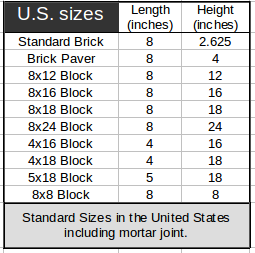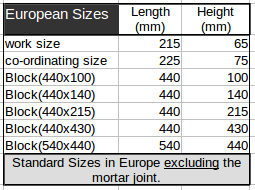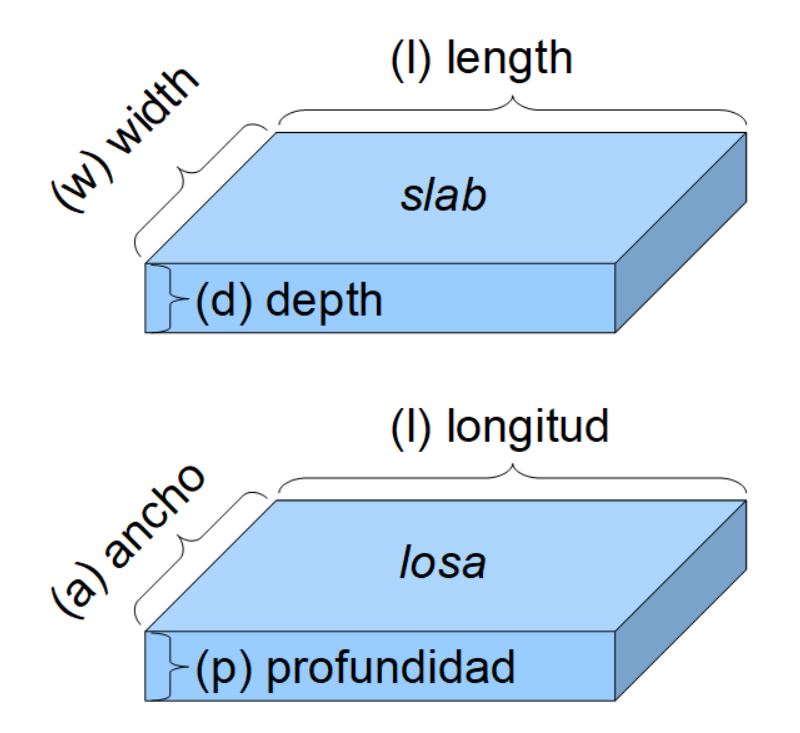The Water Needed for Concrete formula computes the volume of water needed to mix an amount of concrete.
INSTRUCTIONS: Choose units and enter the following:
- (V) Volume of Concrete
Water for Concrete (Wtr): The calculator returns the volume of water in gallons. However, this can be automatically converted to compatible units via the pull-down menu.
The Math / Science
Concrete mix requires about 3.5 quarts per 80 lb bag (0.6 cubic feet). That's a volume ratio of 0.195 water to concrete.
The formula for Water needed for Concrete is:
Wtr = V*CWR
where
- Wtr = Volume of Water
- V = Volume of Concrete
- CWR = Concrete to Water Ratio (0.194950810185185 real)
Rebar and Slab Calculators:
- Rebar Calculator (Spanish Version: Calculadora de Barras de Refuerzo)
- Weight of Any Volume of Concrete
- Rebar and Concrete Volume and Weight in a Slab
- Rebar Weight
- Length of Rebar needed for a slab.
- Weight of Rebar in a slab.
- Weight, Volume of Concrete and Surface Area of a Concrete Slab
- Surface Area of a slab
- Surface Area of Concrete Forms.
- Volume of Concrete in a slab.
- Water Needed for Concrete
- Rebar and Concrete in a Slab
- Length of Rebar in Grid
- Weight of Rebar in Grid
- Rebar in a Wall
- Rebar in an Irregular Shaped Slab
- Rebar in a Circular Slab
- Rebar Lapping Length
- Rebar Cost Estimate
- Weight of Length of Rebar
- Concrete Displaced by Rebar
- Total Weight of a Slab with Rebar
Masonry Wall Calculators (Brick, Block, Mortar Joints)
Bricks or Blocks for a Wall: Computes the number of bricks or blocks needed for a wall based on the wall's dimensions and the size of the bricks or block.
- Brick Block Wall Cost: Computes the number of brick or block needed for a wall based on the wall dimensions and the brick or block size, and then applies a cost per unit to the number to estimate the total cost of bricks or blocks.
- Mortar Requirement for Wall: Computes the amount of mortar for a wall based on the dimensions of the wall and the size of the brick or block used.
- Bricks for a House: Estimates the number of bricks needed for a four walled structure (e.g., house) based on the building dimensions, the size of the bricks or blocks and the square footage dedicated to doors and windows.
- Cost of Bricks for a House: Estimates the number of bricks for a four walled structure and applies a unit price per brick or block to estimate the total cost.
- Block for a Foundation: Computes the number of blocks needed for the walls of a foundation based on the dimensions of the foundation and the size of the blocks.
- Cost of Blocks for a Foundation: Estimates the number of block for the wall of a foundation based on the dimensions of the foundation and the size of the blocks, and then applies the unit price per block to provide cost estimate.
- Mortar Needed for Foundation: Estimates the amount of mortar needed for the cinder block walls of a foundation based on the dimensions of the walls, size of blocks, and thickness of the mortar joint.
- Bricks per Row:
 Computes the number of bricks in a row based on the length of the row, the size of the bricks and the width of the mortar joint.
Computes the number of bricks in a row based on the length of the row, the size of the bricks and the width of the mortar joint. - Bricks High: Computes the number of rows of bricks to achieve a height based on the height and the size of the bricks.
- Custom Stone in a Wall: Computes the number of masonry units (stone, block or stone) in a wall based on the dimensions of the wall and the dimensions of the units and the thickness of the mortar joints. It also returns the number of rows needed and the number of stone per row.
- Concrete, Rebar and Forms for Wall:
 Computes the volume of concrete, amount of rebar and the surface area of forms for a concrete wall.
Computes the volume of concrete, amount of rebar and the surface area of forms for a concrete wall. - Price of Delivered Concrete: Computes the price of delivered concrete based on the volume, price per cubic yard, pumping cost, delivery distance, and mileage.
- Water Needed for Concrete: Compute the amount of water needed to make a volume of concrete.
- Concrete Mix: Computes volume and weight of cement, sand, gravel and water requires to make a volume of concrete.
Bags of Concrete Calculators
Functions and data associated with using bags of concrete in different sizes (40lb, 60lb and 80lb) to fill concrete slabs of different shapes (rectangular, round, polygon).
- Concrete Bags from Volume
- Price of Concrete using Bags: Compute the cost of a volume of concrete (e.g., 4.2 cubic yards) using bags of concrete.
- Concrete by 40lb bag: Computes the number of 40 pound bags of concrete and water needed to mix a volume of concrete.
- Concrete by 60lb bag: Computes the number of 60 pound bags of concrete and water needed to mix a volume of concrete.
- Concrete by 80lb bag: Computes the number of 80 pound bags of concrete and water needed to mix a volume of concrete.
- Concrete Bag Volume: Computes the cubic yards of concrete that can be made from a number of bags of concrete.
- Concrete in Rectangle Slab
- 40lb bags in a Slab:
 Computes the number of 40 pound bags of concrete, length of form boards, and water needed for a rectangle (square) slab based on the dimensions of the slab.
Computes the number of 40 pound bags of concrete, length of form boards, and water needed for a rectangle (square) slab based on the dimensions of the slab. - 60lb bags in a Slab: Computes the number of 60 pound bags of concrete, length of form boards and water needed for a rectangle (square) slab, footer, sidewalk, driveway or curb.
- 80lb bags in a Slab: Computes number of 80 pound bags of concrete, length of form boards and water needed for a rectangle (square) slab.
- 40lb bags in a Slab:
- Volume of Circular Slab
- 40lb Bags a Circular Slab: Computes the volume of a circular slab and returns the number of 40 pound bags needed, the volume in cubic yards, surface area in square feet, circumference in feet, and the water requirement for making the concrete.
- 60lb Bags for Circular Slab: Computes the volume of a circular slab and returns the number of 60 pound bags needed, the volume in cubic yards, surface area in square feet, circumference in feet, and the water requirement for making the concrete.
- 80lb Bags for Circular Slab: Computes the volume of a circular slab and returns the number of 80 pound bags needed, the volume in cubic yards, surface area in square feet, circumference in feet, and the water requirement for making the concrete.
- Concrete in Polygon Slab: Computes the amount of concrete (volume) in a polygon shaped concrete slab
based on the diameter of the slab, number of sides (e.g., 8 for octagon), and depth. It also returns number of bags (40lb, 60lb, 80lb), water required to make the cement, surface area, length of the individual sides and the total length of the form boards.
- Water Needed for Concrete: Computes the amount of water needed to make a volume of concrete.
- Concrete around Circular Post: Computes the volume of concrete including bags of concrete (40lb, 60lb, 80lb) around a number of round posts in a round hole based on the size of the hole and dimensions of the post.
- Concrete around Square Post: Computes the volume of concrete including bags of concrete (40lb, 60lb, 80lb) around a number of square post (e.g., 6x6) in round hole based on the dimensions of the post, depth and width of the round hole.
- Concrete Mix: Computes volume and weight of cement, sand, gravel and water requires to make a volume of concrete.
- Data Items
- Cubic Feet of Concrete in a 40lb bag: 0.3 ft3
- Cubic Feet of Concrete in a 60lb bag: 0.45 ft3
- Cubic Feet of Concrete in a 80lb bag: 0.6 ft3
- Retail Concrete Price Survey:
- Price Survey Date:6/17/24
- Price Survey Online Store: MULTIPLE
- Manufacturer: MULTIPLE
CAUTION: The pricing information provided is for calculating convenience with NO implied guarantees to the accuracy of the values listed. Authoritative sources should be sought to confirm any value before risking health or wealth on the veracity of the data. Furthermore, Calc gives no guarantee that you will be able to buy products at listed prices or even if they will be available. The data provided is purely a convenience for making estimates, so we repeat, ALWAYS use local pricing and authoritative specifications.
